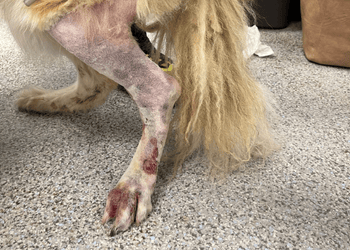Snakebites and Your Pet: What if a Venomous Snake Strikes?
If your pet is bitten by a snake, knowing how to respond can make all the difference for your pet’s wellbeing.
The sun is shining, and the outdoors are calling! Whether you are enjoying a hike or a nice afternoon in the yard with your pet, it’s important to remember that snakes enjoy the warmer weather, too. A curious pet and a venomous snake is a combination that can end in life-threatening snakebites. If your pet is bitten, knowing how to respond can make all the difference for your pet’s wellbeing.
Avoiding Snake Encounters
Sometimes, snakebites are unavoidable. However, there are some ways that you can reduce the chance of accidentally coming too close to a snake in the first place. If you do encounter a snake (or even hear a rattle), slowly move away from the area.
In the yard:
- Check for injuries when you bring your pet inside.
- Clear debris from yard.
- Keep grass mowed to deter snakes.
- Monitor your pet while it’s outside.
While hiking with dogs:
- Ensure that you and your dog stick together and keep them on a short leash.
- Know your nearest emergency veterinary hospital when travelling.
- Look ahead on the trail and observe your surroundings. Some snakes blend in seamlessly in the wild.
- Stick to well-hiked trails, especially during late spring/early summer. Snakes want to avoid humans (and dogs) and are more apt to stay away from busy areas.
- Stay on cleared, open sections of trails. Thick brush, large rocks, and fallen logs all serve as a perfect hiding spot.
- Use trekking poles. Not only can they add to your workout, but they also enable you to push back brush stretching over trails which can be a favorite, sunny spot for snakes to snooze.
It is also helpful to know what types of venomous snakes are in your area to understand areas they may frequent and their behavior. The National Institute for Occupational Safety and Health has some helpful information on identifying types of venomous snakes that are commonly found in the United States.
What Do Bites Look Like?
Snakebites are most common on the face and legs. The snake usually leaves two punctures, which can be so tiny that they are hard to see. If the bite is surrounded by hair or in a hard-to-see location, it may be especially difficult to locate the marks. Many owners do not realize their pet is bitten until they notice swelling and evidence of pain, such as limping.
- Initial signs of a snakebite may include:
- puncture wounds (possibly bleeding)
- restlessness, panting, or drooling
- severe pain
- swelling
- The following signs may develop over time:
- diarrhea
- lethargy, weakness, sometimes collapse
- limping
- muscle tremors
- seizures
- severe bruising
- shallow breathing

Venomous Snakebites and Your Pet
Bites from venomous snakes are a painful medical condition that can be life-threatening. However, snakebites are rarely fatal when treated quickly by a veterinarian. Should your pet receive a snake strike, many MedVet locations are open 24/7 to provide supportive care.
These tips can help your pet while you seek medical help:
- Try to stay calm. Realizing that your pet has been bitten by a venomous snake is scary, but by maintaining composure, you can help your pet get care faster.
- Seek emergency veterinary care immediately. The sooner a pet receives emergency care and, if possible, antivenom, the greater the chance of survival.
- Carry your pet to the car if you’re able, or walk slowly, to inhibit the snake venom moving through your pet’s body.
- Help your pet stay cool and hydrated.
- Try to avoid touching the bite area as it may be painful.
It is important to note that there are no over-the-counter medications that can safely help with alleviating the effects of snakebite.
Treating Pets with Snakebite
Pain medication, intravenous (IV) fluids, and antivenom can help your pet recover and reduce discomfort.
What is antivenom/antivenin?
Antivenoms (also called antivenins) are the best treatment to minimize swelling and reduce the severe complications that can result from the snake’s venomous bite. They are purified antibodies that work against the venom directly to neutralize the toxic tissue effects. They can prevent some of the most severe localized swelling and pain and greatly reduce the chances that the venom will cause tissue damage and or cause the pet to go into shock or develop issues with blood clotting.
Where do I get antivenom/antivenin?
Most veterinary emergency facilities (including MedVet) and some general practice veterinarians keep antivenom/antivenin on hand. If you are unsure, you can call the hospital before bringing your pet in.
Acting Quickly can Save Your Pet from Snakebites
You may not be able to avoid all snake encounters so knowing what to do if your pet receives a bite can be the difference between life and death. If you suspect your pet has a snakebite, contact your nearest MedVet or other emergency facility right away.
Pet Care Resources
For ways to ensure your pet lives a happier, healthier life, visit our Pet Care Resources library.
View ResourcesPet Care Resources
For ways to ensure your pet lives a happier, healthier life, visit our Pet Care Resources library.
View Resources